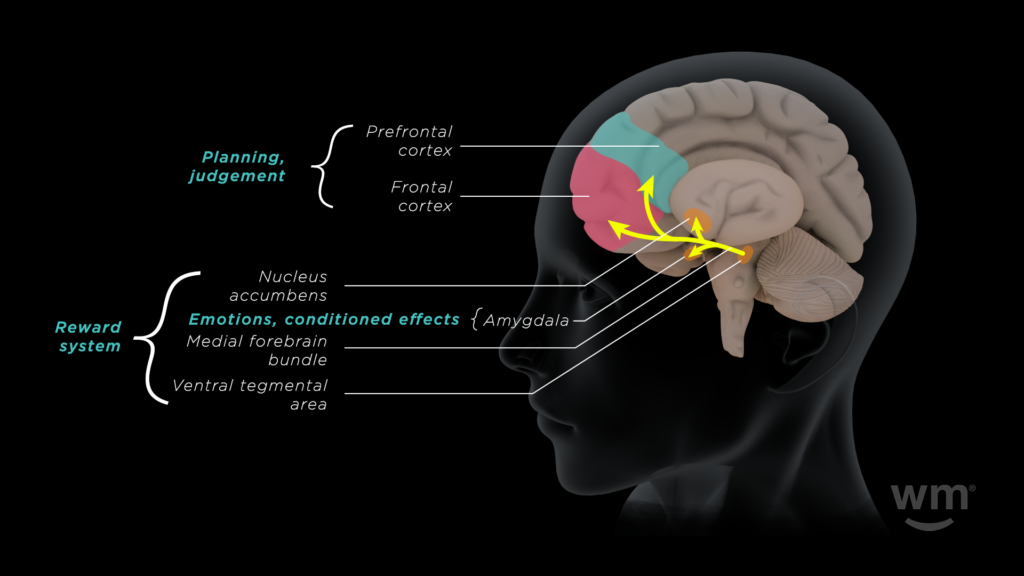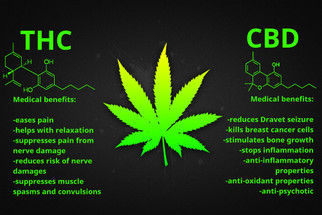Posted by Weedmaps on Oct 10th 2018
Why THC Gets You High and CBD Doesn’t
Whether it’s THC and CBD, or tetrahydrocannabinol and cannabidiol, respectively, chances are you’ve heard about these two cannabinoids. They’re not only the most well-known, but the most prevalent compounds in the cannabis plant.
The quick wrap on these two compounds usually goes something like this: THC gets you high and CBD doesn’t, but that’s just a small part of the story.
Each cannabis plant contains a rich profile of cannabinoids that interact with our bodies in unique and sophisticated ways. Start unpacking the science behind THC and CBD, and one thing becomes clear: there’s far more to these incredible cannabinoids than their most apparent effects would suggest.
THC is Cannabis’ Most Well-known and Desired Compound
Cannabis is one of the safest intoxicating substances on the planet. As with other intoxicating drugs, the precise mechanisms by which cannabis produces intoxication aren’t entirely known. We can, however, conclude a few important things.
The main intoxicating ingredient in cannabis is delta-9-tetrahydrocannabinol (THC). The intoxicating properties of THC were first described in the 1940s, however our understanding of THC dramatically improved once the Israeli scientist Rafael Mechoulam synthesized this molecule in 1965.
THC is an agonist, or activator, of the cannabinoid 1 (CB1) receptor. When cannabis is given to people who have had their CB1 receptors blocked (by a different drug, called an antagonist), cannabis cannot get them high. So, we know that the CB1 receptor must be the critical target in the brain that produces intoxication.
Brain imaging studies have shown increased blood flow to the prefrontal cortex region of the brain during THC intoxication. This region of the brain is responsible for decision-making, attention, and other executive functions, like motor skills. In short, THC intoxication can affect any of these functions to varying degrees depending on the person.

Another important factor in cannabis intoxication involves the activation of the brain’s reward circuitry, which feeds our emotional and memory processes. Ultimately, the activity in these regions produces pleasurable sensations and emotions that encourage us to revisit that greasy burger place for a calorie-dense meal or ask a potential mate out on another date.
Cannabis activates the brain’s reward pathway, which makes us feel good, and increases our likelihood of partaking again in the future. THC binding to CB1 receptors in the brain’s reward system is a major factor in cannabis’ ability to produce feelings of euphoria.
There is a Lot More to CBD Than “It Doesn’t Get You High.”
But THC is far from the only ingredient in cannabis that has a direct impact on brain function. The most notable comparison is with cannabidiol (CBD), which is the second most abundant cannabinoid found in the plant. CBD is often touted as “non-psychoactive,” however this statement is somewhat misleading. Any substance that has a direct effect on the function of the brain is considered to be psychoactive. CBD most certainly does this, as it has very powerful anti-seizure and anti-anxiety properties.

CBD is indeed psychoactive; it’s just not intoxicating. The reason for this is that unlike THC, CBD is exceedingly bad at activating the CB1 receptor. In fact, evidence suggests that it actually interferes with the activity of the CB1 receptor, especially in the presence of THC. When THC and CBD work together to affect CB1 receptor activity, users tend to feel a more mellow, nuanced subjective high and have a much lower chance of experiencing paranoia compared to the effects felt when CBD is absent. That’s because THC activates the CB1 receptor, while CBD inhibits it. The presence of both cannabinoids balances the effects.
Things get particularly interesting when other cannabinoid and terpene molecules are consumed alongside THC and CBD. Although we are just beginning to understand the isolated effects of cannabinoids such as CBN, CBC, and CBG, their ability to bind to targets in the brain means they could potentially enhance, interfere with, prolong, or in some other way modulate the effects of THC. It’s entirely possible that some of cannabis’ most well-known effects (such as couch lock) may have very little to do with THC itself, but rather, the relative contributions of these lesser-known molecules.
Cannabis is a complex plant with relatively little available research into its effects and interactions with the human body — and we’re just beginning to learn the many ways cannabis compounds work together to change the way we feel.


